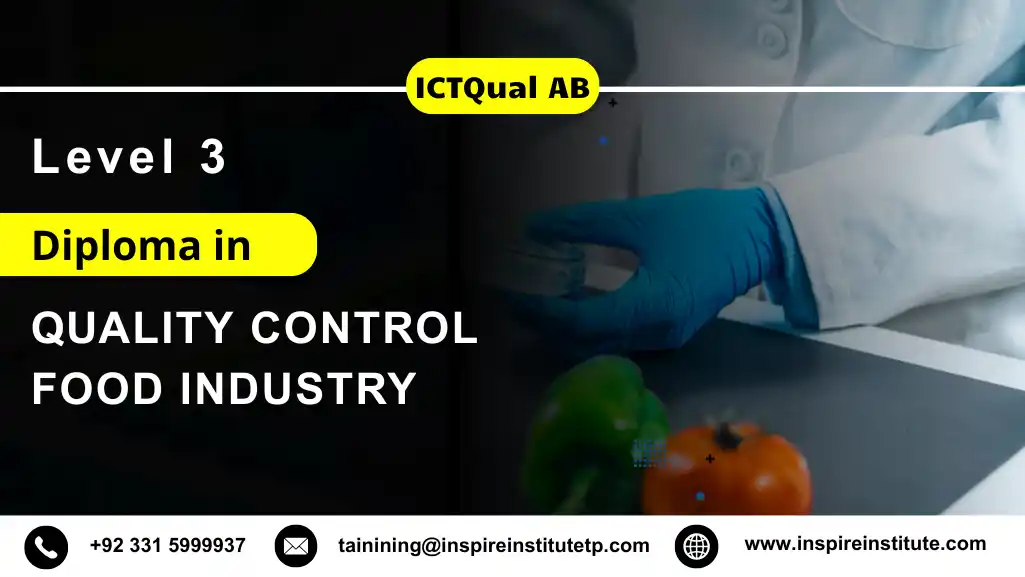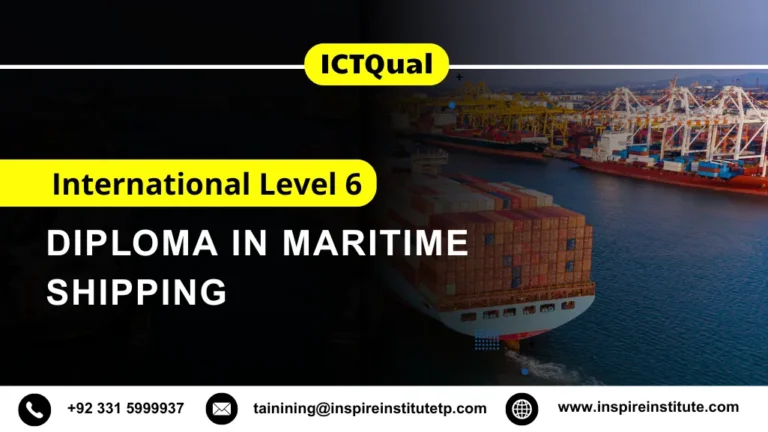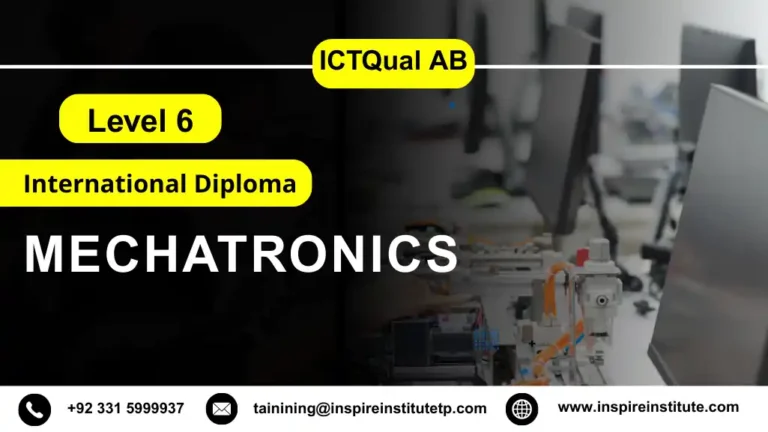ICTQual AB Level 3 Diploma in Quality Control Food Industry
The ICTQual AB Level 3 Diploma in Quality Control Food Industry provides a solid foundation for those looking to begin or enhance their career in food quality assurance. Maintaining high standards of quality control is essential in the food industry to ensure product safety, regulatory compliance, and consumer satisfaction. This diploma is a nationally recognised qualification designed to equip learners with fundamental knowledge and practical skills in food safety, quality control procedures, and regulatory requirements. It is ideal for individuals seeking to develop expertise in the food manufacturing and processing sectors.
The course focuses on practical and theoretical knowledge that enables learners to identify and control potential hazards, manage food safety systems, and maintain product integrity throughout the supply chain. With increasing global demand for high-quality, safe food, organisations across the sector are seeking professionals with a strong grasp of quality assurance principles. This diploma helps learners meet that demand with confidence and competence. The practical approach adopted throughout the diploma ensures that learners can apply their knowledge directly in real-world settings, contributing to improved safety, reduced waste, and enhanced customer satisfaction.
Why Choose this Qualification
The ICTQual AB Level 3 Certificate in Quality Control Food Industry is a strategic choice for professionals looking to advance their career in food safety and quality management. Key reasons to choose this qualification include:
- Enhances Knowledge of Food Quality and Safety: Gain a comprehensive understanding of quality control procedures, food safety standards, and hygiene practices.
- Develops Practical Skills: Learn how to inspect, test, and monitor food products effectively, applying industry-standard techniques.
- Boosts Career Opportunities: Increase your employability and prepare for roles such as Quality Control Officer, Food Safety Supervisor, or Laboratory Technician.
- Ensures Regulatory Compliance: Acquire the knowledge needed to meet UK food industry regulations and quality standards.
- Supports Career Progression: Provides a foundation for further study in advanced food quality management qualifications.
- Suitable for a Wide Range of Learners: Whether you are new to the industry or already working in food production, this qualification offers valuable skills for professional growth.
Choosing this certificate demonstrates commitment to maintaining high standards of food quality and safety, making it an essential step for anyone serious about a career in the food industry.
Course Overview
Awarding body : ICTQual AB
Course Level: 3
Credits : 30
Study Units: 6 Units
Evidence & Assignment Based
Qualification Structure
This qualification, the ICTQual AB Level 3 Diploma in Quality Control Food Industry, consists of 6 mandatory units.
- Food Quality Management Systems and GMP Implementation
- Hazard Analysis and Critical Control Points (HACCP) in Practice
- Food Labelling, Packaging Integrity, and Consumer Protection
- Microbiological Testing and Allergen Management in Food Processing
- Auditing and Internal Quality Assessments in the Food Industry
- Documentation and Reporting for Food Quality Compliance
Who Should Take This Course
The ICTQual AB Level 3 Diploma in Quality Control Food Industry is designed for a range of learners looking to build or enhance their expertise in food quality control.
- Entry-Level Food Industry Workers: Those beginning their career in food production, processing, or quality assurance roles.
- Quality Control Assistants: Individuals seeking to formalise their skills and gain recognised certification.
- Career Changers: Professionals from other sectors who want to transition into the food quality control industry.
- Employers’ Staff: Organisations looking to upskill employees involved in food safety and quality assurance.
- Students and Trainees: Individuals pursuing vocational qualifications who want to specialise in food quality control.
By taking this ICTQual AB Level 3 Diploma in Quality Control Food Industry, you equip yourself with the foundational knowledge and practical skills required to succeed in food quality assurance and open pathways for further career development.
Course Benefits
Understanding the benefits of a qualification helps you make an informed decision about your education and career path. The ICTQual AB Level 3 Diploma in Quality Control Food Industry offers a variety of advantages for learners at the start of their food quality control journey.
- Solid Foundation in Food Safety: Learn key principles of food hygiene, contamination prevention, and quality assurance practices essential for maintaining safety standards.
- Practical, Work-Related Skills: Develop hands-on skills through real-world scenarios and quality control techniques relevant to the food industry.
- Improved Employment Prospects: Holding a recognised diploma enhances your credibility and increases your chances of securing entry-level roles in food manufacturing and processing.
- Flexible Learning Options: Study at your own pace with online, part-time, or blended learning modes, accommodating your personal and professional commitments.
- Pathway for Career Progression: Use this diploma as a stepping stone to higher qualifications and more advanced roles within food safety and quality management.
- Increased Confidence: Gain the knowledge and skills to confidently contribute to maintaining and improving food quality standards in the workplace.
By completing the ICTQual AB Level 3 Diploma in Quality Control Food Industry, you position yourself for success in the dynamic and growing food sector.
Eligibility Criteria
Before enrolling in the ICTQual AB Level 3 Diploma in Quality Control Food Industry, it is important to understand the eligibility requirements to ensure the course is the right fit for you.
Minimum Age
Candidates should be at least 16 years old to register for this diploma.
Educational Background
No formal qualifications are strictly required, making this course accessible to beginners and those new to the food industry.
Work Experience
While prior experience in food production or quality control is not mandatory, familiarity with the food environment can be beneficial.
Language Proficiency
A basic understanding of English is necessary to comprehend the course materials and complete assessments successfully.
Technical Skills
Basic computer literacy and access to a device capable of supporting online learning platforms are recommended, especially for remote study options.
The Qualification Process
The ICTQual AB Level 3 Diploma in Quality Control Food Industry follows a structured and learner-friendly qualification process that blends academic study with real-world coaching skills. The process is designed to develop competent, ethical, and client-focused health coaches who are capable of supporting others in achieving sustainable lifestyle changes. Below is an overview of the key stages in the qualification journey:
• Admission and Enrolment
Learners begin by applying through an approved ICTQual AB training provider, where they must:
• Submit proof of identity and academic qualifications (typically Level 3 or equivalent)
• Demonstrate proficiency in English (e.g., IELTS 5.5 or equivalent)
• Complete a personal statement or interview (where required) to assess interest in health and wellness coaching
Once approved, learners are formally enrolled and given access to course resources.
• Course Orientation
New learners receive a full orientation that includes:
• An introduction to the course structure, units, and learning outcomes
• Guidelines on assignments, deadlines, and tutor support
• Information about coaching practice expectations and ethical conduct
• Programme Delivery
The course is delivered through a flexible format, which may include:
• Online, blended, or classroom-based learning
• Interactive webinars and tutorials
• Independent reading and research
• Practical exercises and case studies
This delivery style supports learners in balancing their studies with work or personal commitments.
• Core Areas of Study
Learners explore a broad and practice-driven curriculum, including:
• Foundations of health coaching and behaviour change
• Goal setting and action planning
• Motivational interviewing and communication strategies
• Health promotion and wellness concepts
• Coaching ethics and professional boundaries
• Reflective practice and personal development
• Coaching Practice
Though not always mandatory, learners are encouraged to:
• Apply coaching tools in real or simulated sessions
• Record and reflect on client progress
• Gather feedback to improve coaching performance
Some training centres may also include practical assessments, role-plays, or coaching portfolios.
• Assignments and Assessments
Assessment is based entirely on coursework. Learners are required to:
• Complete written assignments, reflective journals, and coaching session plans
• Submit case studies and progress reports
• Demonstrate understanding of theory through practical application
• Present evidence of learning in a structured portfolio
• Tutor Support and Feedback
Throughout the course, learners benefit from:
• One-on-one academic guidance
• Regular tutor feedback on assignments
• Coaching supervision or mentorship (depending on provider)
• Access to learning platforms and study materials
• Internal and External Quality Assurance
All assessments are:
• Internally verified by the training provider
• Externally quality-assured by ICTQual AB to ensure fair grading and regulatory compliance
This two-tier system maintains the academic integrity and credibility of the qualification.
• Certification
Upon successful completion of all course units and submission of required evidence, learners are awarded the ICTQual AB Level 3 Diploma in Quality Control Food Industry.
• Post-Qualification Progression
Graduates of this diploma can:
• Begin or advance a career as a Quality Control Food Industry
• Work in private practice, community health programmes, or corporate wellness
• Progress to higher-level coaching or health-related qualifications
• Seek accreditation with national or international coaching bodies (subject to additional requirements)
This structured process ensures learners graduate with the practical confidence, professional standards, and academic grounding needed to thrive as ethical and effective health practitioners in a growing global wellness industry.







